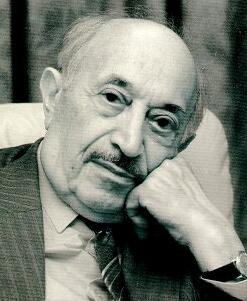

|
"Through this false attitude that we must ignore Jewish helpers of the Nazis, we are losing credibility when we say we are acting against all people that commit crimes. If everybody could see that we are not looking only for Germans and Ukrainians, but even for our own Jewish criminals, then we would have much less opposition." � Simon Wiesenthal
|
|
19 May 2004 |
|
The end of the war did not mean the end of violence against Simon Wiesenthal. Within days of his ultimate liberation by the Americans, he had been beaten up in Mauthausen by a future Polish Vice-Minister of Culture. A little more than a year later, in a Displaced Persons camp near Linz, he had been attacked by a knife-wielding ex-Gestapo agent named David Zimet � a Jew! Zimet had been a ghetto policeman in the southern Polish city of Tarnow and, says Wiesenthal, "the right hand of a very known Gestapo sadist with the name of Grunov. Later, Zimet was sent to Mauthausen to work in the crematory. His family stayed in Tarnow. When the Russians came near Tarnow on their way to fight for Cracow, the Germans started more deportations of the few hundred Jews that were left from twenty thousand before the war, most of who died in Belzec in 1942. Since there were no more trains, they sent them in trucks. In one truck of Jewish women was the wife and the daughter of Zimet. And the hatred against him was so great that the Jewish women in that truck taking them all to die killed his wife and his daughter then and there." By 1946, Zimet was a DP in Austria and was recognized by several survivors from Tarnow. Wiesenthal was still collecting testimony about him in the DP camp when Zimet learned that Simon was, as he puts it, "occupied with his case, so at seven o'clock in the morning he is coming to my office there with a knife. He was a big, strapping healthy man back in '46 while we were all still so thin. He had lived good in the ghetto and, in the crematorium at Mauthausen, they were all given double food ... No, I didn't know him in Mauthausen. I see him for the first time when he bursts in and attacks me. I pick up the inkwell from my desk and throw it at his face to protect myself and I shout so loud that people come running to help me and he is arrested. Zimet was four weeks in jail for this. But then, because he had worked in the crematory, they need him for the Mauthausen trial and bring him to Germany as a witness. From Germany, he emigrates to Canada." Years later, Wiesenthal was looking over a confidential list of cases being investigated by the Royal Canadian Mounted Police when he read: ZIMET, David: A policeman in ghetto in Tarnow. Witnesses have attested to his brutality."Zimet!" Wiesenthal exclaimed. "This is my old case!" He informed the Canadian authorities of his evidence against Zimet, but they proved unwilling to prosecute a Jew for Nazi crimes. The Canadian Jewish Committee intervened and Zimet agreed to submit to a council of arbitration established by the committee. "Nothing ever came of it," says Wiesenthal, "because the Jewish community was reluctant to publicize the case since Zimet was himself Jewish. This is so terrible! Through this false attitude that we must ignore Jewish helpers of the Nazis, we are losing credibility when we say we are acting against all people that commit crimes. If everybody could see that we are not looking only for Germans and Ukrainians, but even for our own Jewish criminals, then we would have much less opposition." Alan Levy, The Wiesenthal File, Constable, London, 1993, pp. 83-84. Polish vowel diacritics removed from place names. |